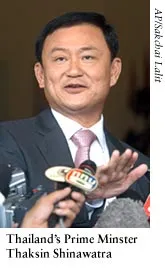Bangkok, Thailand, July 19, 2005—Thailand’s cabinet today imposed emergency rule empowering the prime minister to censor the media in the country’s three Muslim-dominated, insurgency-hit southern provinces. The measure also gives the government power to detain suspects without trial, tap telephones, monitor e-mail exchanges, and confiscate suspects’ property in Yala, Narathiwat and Pattani provinces.
There were no immediate reports of government censorship, but journalists say the measure could allow Prime Minister Thaksin Shinawatra to censor content and close publications deemed to be against national interests.
“The prime minister and his cabinet should not override freedoms guaranteed by Thailand’s constitution,” Ann Cooper, executive director of the Committee to Protect Journalists, said from New York. “We call on the government to immediately reconsider this measure and allow the press to freely report and disseminate news about the security situation in southern Thailand.”
Thaksin drafted and King Bhumibol Adulyadej endorsed the emergency decree late last week. The security situation in Thailand’s southern provinces has sharply deteriorated, resulting in the deaths of more than 800 security forces, insurgents, and civilians since January 2004.
Thaksin and other senior officials allege that local and international coverage of the conflict has been irresponsible and inaccurate. News from the conflict, featured prominently in the English-language and vernacular press, often takes a critical stance toward the government’s perceived use of excessive force in putting down the insurgency.
Thai security forces came under domestic and international condemnation for their handling of a siege on a Muslim shrine in Pattani in April 2004, when more than 100 Thai Muslims died, and for the alleged suffocation deaths of at least 85 Thai Muslims who were being transported in military vehicles in October 2004.
Officials have tried to deflect criticism of the executive decree and the extraordinary powers it gives the prime minister, claiming the government will not use the decree to curb press freedoms outside the violence-wracked provinces. But the Thai Journalists’ Association condemned the emergency measures, saying they could effectively prevent the media from reporting on the unrest in the southern provinces.
CPJ also expressed deep concern about the criminal and civil defamation cases filed by the Shin Corp. against media reform activist Supinya Klangnarong and the editors of the Thai Post newspaper. The Shin Corp. is demanding an exorbitant 400 million baht (US$9.6million) in damages in the civil case, while Supinya faces up to one year in prison in the criminal case. Hearings in the criminal case opened today in a Bangkok court, with the Shin Corp. making its opening arguments.
The judge presiding over today’s proceedings requested that the defendant’s attorney “show sympathy” while cross-examining the Shin Corp’s legal representative, according to Shawn W.Crispin, CPJ’s Asia-based consultant who is monitoring the trial. Hearings in the criminal matter are scheduled to extend over the next four months; depending on the verdict, the civil trial could follow.
Shin Corp. was founded by Thaksin and is majority owned by his family.
CPJ called on the Thai judiciary today to uphold the legal protections of freedom of speech and freedom of the press enshrined in the country’s 1997 constitution.
“International experience shows that criminal libel laws have a chilling effect on press freedom and freedom of expression, resulting in a high degree of self-censorship among journalists,” Crispin said. “We urge authorities in Thailand, historically home to one of Asia’s most vibrant press corps, not to head down that dangerous path.”
![]()
